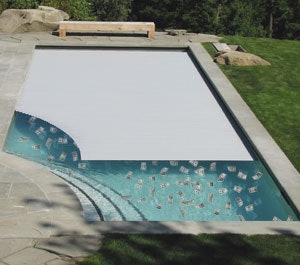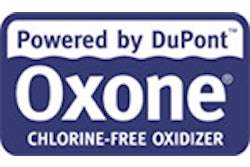
That was then. Today we have what is approaching national mobilization to improve energy efficiency and landmark national legislation to improve pool safety with monitoring set to take effect in just three months.
As a product whose principal benefits are, coincidentally, energy conservation and pool safety, it's no surprise the automatic pool cover (APC) is enjoying a boost in sales. Add in design changes that make APCs more reliable and much easier to install on a wider array of pools, and you've got a recipe for phenomenal growth.
"Several different factors are simultaneously impacting the APC industry, causing change," says Wesley Mathis, founder, Pool Cover Specialists National, West Jordan, Utah, a 38-year veteran of the business. "Just five years ago, the APC was pretty much considered a high-end option, an expensive piece of equipment.
"Now every indicator is pointing to a paradigm shift in the way APCs are perceived by builders nationwide. It's happening fast due to energy and safety."
Mathis notes that pool owners with heaters can't continue to pay to generate heat and then lose it to the atmosphere. "I think that within three or four years you will see APCs considered in the same way as heaters - a much more standard piece of equipment. I think in a few years it will be something like, 'Here's your pool, here's your heater, here's your automatic pool cover.'"
While energy and safety awareness are prodding homeowners to add APCs to their pool packages, there's a regional component to their stalwart sales performance in a down economy, adds Rick Clark, owner, Cover-Pools, Salt Lake City.
"First off, new pool sales are suffering the most in the Sunbelt states, but those states have always been the weakest states for APCs. That's because fewer people heat their pools in the South, and therefore an APC doesn't save them any money in heat loss. So that's not a sales feature there."
Clark notes that APC sales increase as you go north, where the downturn in new pool permits is less pronounced. In this way, the losses in the new pool market have struck APCs only obliquely.

At the same time, he adds, "many pool builders have figured out that if the market is down a bit, and if they're going to sell fewer pools, they need to make more on each pool they sell. And one of the ways they are doing that is by trying to load them up with additional accessories, like pool covers, that have good profit margins.
"And covers help them sell more pools. There have been many studies over the years that have shown that the two main reasons that people do not buy pools are concerns about safety and concerns about maintenance, and a cover addresses both.
"A builder can go to a customer and say, 'I have a product that will significantly reduce if not eliminate those concerns.'"
Energy Urgency
Indeed, the issues of safety and maintenance - maintenance defined as incorporating everything from operational energy costs to sanitization costs - have recently come to dominate discussion in the industry.
Energy, and to a lesser extent, water savings, have acquired a note of urgency as kilowatt rates rise throughout the country and droughts are declared in certain regions. Using these two resources efficiently has become basic design criteria for pools, notes Jeff Farlow, program manager for energy initiatives, Pentair Water Pool and Spa, Sanford, N.C.
"And," he notes succinctly, "you can't really talk about a truly energy- and water-efficient pool system while the pool remains uncovered."
Without that cover, a significant portion of everything that goes into a pool - water, heat, sanitizer - comes back out, and drifts away into the atmosphere.
It's evaporation, the physical process of turning a liquid into a gas, that is the real culprit. When a drop of water changes from a liquid to a gas - without actually raising its own temperature even one degree - it sucks in a great deal of heat from its environment in order to make the transition to a new state. This happens on your skin after a good workout, and it happens on a much larger scale on the surface of a pool.
Tom Dankel, vice president, Aquamatic Cover Systems, Gilroy, Calif., notes that "70 percent of heat loss in an uncovered pool is purely evaporation. Somehow you've got to replace all that heat from either your heater or the sun, and that just takes a lot of energy and time."
Compared to that enormous amount of lost heat, Mathis says, the energy usage by the cover is negligible. "Ours draws three amps for a few seconds. So it's not even an issue."
The energy loss of an uncovered pool goes far beyond evaporation, notes Dankel. When a pool is kept clean through the use of an automatic pool cover, pool filtration time can be reduced, dramatically cutting the amount of electricity consumed by the pump.
"I have a very large pool (38,000 gallons)," he says. "With a cover, I'm pumping about 4 to 5 hours a day. Without one, I'd be at eight to 12 hours a day to get it clean. You amortize that over the course of a year, and it's a huge savings."
As powerful as those arguments are, Barry Cyr, service manager, Automatic Pool Covers, Fishers, Ind., throws in one more - sanitization consistency.
"Keeping the chemical balance consistent is one of the major features of automatic pool covers," he says. "It's not just a matter of keeping chemicals in the pool that would be lost to evaporation. Water chemistry is easier when organics are not being blown into the pool, and algae spores are kept in the dark."
Safety Imperative
The other concern affecting automatic pool covers is safety, an issue that has loomed larger with each passing year, culminating in an act of Congress signed into law last December.
While the pool and spa industry has been slow to react to the implications of the Virginia Graeme Baker Act, it will go into effect December of 2008. And while it's impossible to gauge the precise effects this law will have on the industry, one of them will likely be building more barriers to pool access with APCs.
According to one section of the act, "In establishing minimum state law requirements for swimming pools" state governments are asked to consider covers, gates with self-latching devices, doors with alarms and pool alarms.
As these safety options are considered, the APC becomes attractive because it offers heat and chemical retention, in addition. And it's effectiveness as a safety barrier to children is beyond dispute, says Clark.
"We refer to the cover as a horizontal fence. But while a fence can be climbed, a cover seals off access to water and removes the attraction of the water itself, the shiny reflection, the floating toys, and all the things that draw a child.
"But what people are really buying with an APC is convenience. Any cover draped over the pool is going to do the same thing. It's just that they're so much work that they'll be put on in the fall and taken off in the spring - it's too much work to put them on every time you leave the pool."
Part Of The Pool
As external market conditions have evolved, raising the issues of safety and energy efficiency to prominence, manufacturers have improved the aesthetics and reliability of APCs by integrating them into the pool.
Back in the '60s and '70s, APCs were mostly the province of gunite pools, where builders could hang the cover track under the coping, leaving it much less conspicuous. Still, even on gunite pools, installation could be a bit tricky, and reliability was sometimes questionable.
"It wasn't that they used to break down so much as that they used to require a lot more expertise to get them in right," says Clark, "and if you didn't get them in right, then they'd break down."
And for vinyl-liner pools of that period, under-track systems were not a practical option. Typically, in those cases, says Mathis, "they had to have that old-fashioned top track, which was mounted to the top of the deck once the pool was completed. It looked like an afterthought."
However, due to the consistent size and components of vinyl-liner pools, the APC industry has been able to develop an integrated panel and track unit that comes to the builder ready to install as a single piece.
"It incorporates the track and the retainer, everything together in one," says Cyr. "Builders love it because they don't have to buy their coping from one vendor, and then buy their track from another and put it together. They're getting the same cover, but it's taking them so much less time to install it. It goes from a full-day installation to just a few hours, because it's simplified."
"Over time," says Lanny Smith, president, Coverstar, a subsidiary of Latham International, Latham, N.Y., "the installation portion of the product has become much more builder-friendly and easier to install. In the process of becoming easier to install, the product has become quite reliable. The gearing, the motors, the overall robustness of the product has been significantly improved."
On the whole, the new systems look like they were made for the pool, says Mathis. "It now looks better than what we were able to do for gunite pools in the early days."
A Pool That Gets Used
These developments - the rise of the importance of energy conservation and safety, along with new capabilities to integrate APCs into mainstream pool projects - have not gone unnoticed by the big players in the industry, Mathis notes.
Two of the major APC manufacturers, Cover-Pools and Coverstar, have been purchased in the last 12 months by Jandy and Poolcorp, respectively. "Those folks are interested," he says, "not just because they see APCs becoming more popular, but because they have good distribution pipelines (Poolcorp in particular). They want to be able to sell auto covers with their kit pools in their distribution pipeline.
"And to do that the APC has to be integrated within the structure of a kit pool. It has to be aesthetically clean and easy to install because they'll be selling those kit pools in places where there won't be a seasoned professional APC installer.
"I think that shows how far we've come as an industry, and that's why companies are looking at us a little differently."












































